Ex-Post Evaluation – Greece
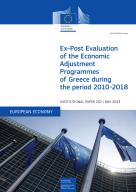
- Report
- Directorate-General for Economic and Financial Affairs
The paper presents the European Commission services’ evaluation of the economic adjustment programmes of Greece during the period 2010-2018.
Post-Programme Surveillance Report – Greece

- Report
- Directorate-General for Economic and Financial Affairs
This report by the European Commission presents the findings of the 5th post-programme surveillance mission to Greece and identifies remaining challenges for the Greek economy.
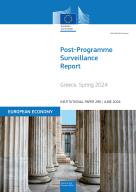
- Report
- Directorate-General for Economic and Financial Affairs
This report by the European Commission presents the findings of the 4th post-programme surveillance mission to Greece and identifies remaining challenges.

- Report
- Directorate-General for Economic and Financial Affairs
This report by the European Commission presents the findings of the 3rd post-programme surveillance mission to Greece and identifies remaining challenges.
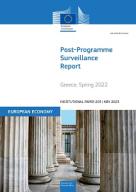
- Report
- Directorate-General for Economic and Financial Affairs
This report by the European Commission presents the findings of the 2nd post-programme surveillance mission to Greece and identifies remaining challenges.

- Report
- Directorate-General for Economic and Financial Affairs
This report by the European Commission monitors Greece’s economic, fiscal and financial situation following the end of enhance surveillance in August 2022, and assesses the specific reform steps as set out in the 14th enhanced surveillance report.
Enhanced surveillance framework for Greece
Enhanced surveillance of Greece ends on 20 August 2022
The enhanced surveillance framework for Greece expired on 20 August 2022. Greece delivered on the bulk of the policy commitments made to the Eurogroup upon its exit from its financial assistance programme in June 2018. Monitoring Greece’s economic, fiscal and financial situation will continue in the context of the post-programme surveillance (PPS) and the European Semester.
- 10 AUGUST 2022
- 10 AUGUST 2022
Fourteenth enhanced surveillance report
On 23 May 2022, the Commission adopted the 14th enhanced surveillance report for Greece. The report assesses Greece’s progress with respect to policy commitments made at the Eurogroup in June 2018. The publication of the report follows regular dialogue with the Greek authorities and a mission held on 6 April 2022, in which staff from the European Central Bank, the European Stability Mechanism and the International Monetary Fund participated.
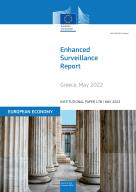
- Report
- Directorate-General for Economic and Financial Affairs
This is the 14th enhanced surveillance report on Greece monitoring the commitments made by the Greek government at the Eurogroup of 22 June 2018.
Thirteen enhanced surveillance report
On 23 February 2022, the Commission adopted the 13th enhanced surveillance report for Greece. The report assesses Greece’s progress with respect to policy commitments made at the Eurogroup in June 2018. The publication of the report follows regular dialogue with the Greek authorities and a mission held virtually on 25 January 2022, in which staff from the European Central Bank, the European Stability Mechanism and the International Monetary Fund participated.

- Report
- Directorate-General for Economic and Financial Affairs
This is the 13th enhanced surveillance report on Greece monitoring the commitments made by the Greek government at the Eurogroup of 22 June 2018.
Twelfth enhanced surveillance report
On 24 November 2021, the Commission adopted the twelfth enhanced surveillance report for Greece. The report assesses Greece’s progress with respect to policy commitments made at the Eurogroup in June 2018. The publication of the report follows regular dialogue with the Greek authorities and a mission held in Athens on 19-20 October 2021, in which staff from the European Central Bank, the European Stability Mechanism and the International Monetary Fund participated.
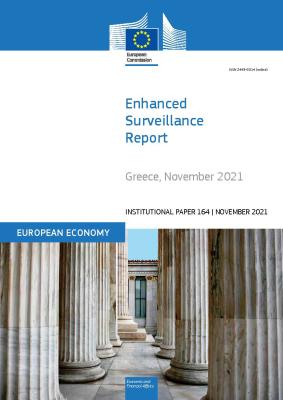
- Scientific paper
- Directorate-General for Economic and Financial Affairs
This is the 12th enhanced surveillance report on Greece monitoring the commitments made by the Greek government at the Eurogroup of 22 June 2018.
Eleventh enhanced surveillance report
On 22 September 2021, the Commission adopted the eleventh enhanced surveillance report for Greece. The report assesses Greece’s progress with respect to policy commitments made at the Eurogroup in June 2018. The publication of the report follows regular dialogue with the Greek authorities and a mission held remotely on 15 July 2021, in which staff from the European Central Bank, the European Stability Mechanism and the International Monetary Fund participated.
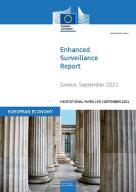
- Report
- Directorate-General for Economic and Financial Affairs
This is the 11th enhanced surveillance report on Greece monitoring the commitments made by the Greek government at the Eurogroup of 22 June 2018.
Tenth enhanced surveillance report
On 2 June 2021, the Commission adopted the tenth enhanced surveillance report for Greece. The report assesses Greece’s progress with respect to policy commitments made at the Eurogroup in June 2018. The publication of the report follows regular dialogue with the Greek authorities and a mission held remotely on 20-21 April 2021, in which staff from the European Central Bank, the European Stability Mechanism and the International Monetary Fund participated.

- Report
- Directorate-General for Economic and Financial Affairs
This is the 10th enhanced surveillance report on Greece monitoring the commitments made by the Greek government at the Eurogroup of 22 June 2018.
Ninth enhanced surveillance report
On 24 February 2021, the Commission adopted the ninth enhanced surveillance report for Greece. The report assesses Greece’s progress with respect to policy commitments made at the Eurogroup in June 2018. The publication of the report follows regular dialogue with the Greek authorities and a mission held remotely on 26-27 January 2021, in which staff from the European Central Bank, the European Stability Mechanism and the International Monetary Fund participated.

- Report
- Directorate-General for Economic and Financial Affairs
This is the ninth enhanced surveillance report on Greece monitoring the commitments made by the Greek government at the Eurogroup of 22 June 2018.
Eighth enhanced surveillance report
On 18 November 2020, the Commission adopted the eighth enhanced surveillance report for Greece. The report assesses Greece’s progress with respect to policy commitments made at the Eurogroup in June 2018. The publication of the report follows regular dialogue with the Greek authorities and a mission held remotely on 19-20 October 2020, in which staff from the European Central Bank, the European Stability Mechanism and the International Monetary Fund participated
This is the eighth enhanced surveillance report on Greece monitoring the commitments made by the Greek government at the Eurogroup of 22 June 2018.
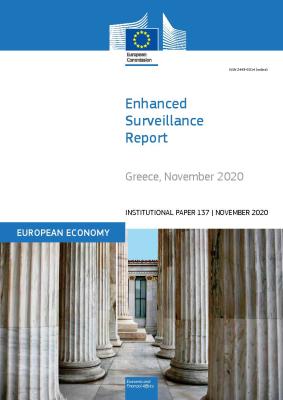
- Scientific paper
- Directorate-General for Economic and Financial Affairs
This is the eighth enhanced surveillance report on Greece monitoring the commitments made by the Greek government at the Eurogroup of 22 June 2018.
Seventh enhanced surveillance report
On 23 September 2020, the Commission adopted the seventh enhanced surveillance report for Greece. The report assesses Greece’s progress with respect to policy commitments made at the Eurogroup in June 2018. The publication of the report follows regular dialogue with the Greek authorities and a mission held remotely on 13-14 July 2020, in which staff from the European Central Bank, the European Stability Mechanism and the International Monetary Fund participated.

- Scientific paper
- Directorate-General for Economic and Financial Affairs
This is the seventh enhanced surveillance report on Greece monitoring the commitments made by the Greek government at the Eurogroup of 22 June 2018.
Sixth enhanced surveillance report
On 20 May 2020, the Commission adopted the sixth enhanced surveillance report for Greece alongside the spring package under the European Semester. The report assesses Greece’s progress with respect to policy commitments made at the Eurogroup in June 2018. The report is based on the findings of a mission held remotely on 8 and 23 April 2020 and regular dialogue with the authorities. The mission was conducted by the European Commission in liaison with the European Central Bank, the European Stability Mechanism and the International Monetary Fund.
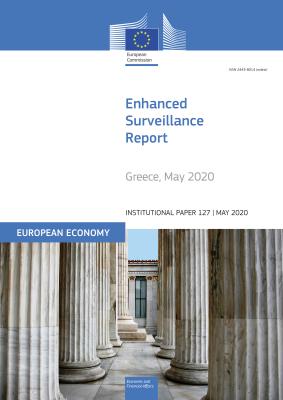
- Report
- Directorate-General for Economic and Financial Affairs
This is the sixth enhanced surveillance report on Greece monitoring the commitments made by the Greek government at the Eurogroup of 22 June 2018.
Fifth enhanced surveillance report
On 26 February 2020, the Commission adopted the fifth enhanced surveillance report for Greeece alongside the winter package under the European Semester. The report assesses Greece’s progress with respect to policy commitments made at the Eurogroup in June 2018. The publication of the report follows a mission to Greece which took place from 22 to 24 January 2020, in which staff from the European Central Bank, the European Stability Mechanism and the International Monetary Fund participated.
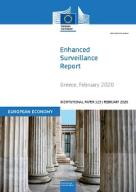
- Report
- Directorate-General for Economic and Financial Affairs
This is the fifth enhanced surveillance report on Greece monitoring the commitments made by the Greek government at the Eurogroup of 22 June 2018.
Fourth enhanced surveillance report
On 20 November 2019, the Commission adopted the fourth enhanced surveillance report for Greeece alongside the autumn package under the European Semester. The report assesses Greece’s progress with respect to policy commitments made at the Eurogroup in June 2018. The publication of the report follows a mission to Greece which took place from 23 to 26 September 2019, in which staff from the European Central Bank, the European Stability Mechanism and the International Monetary Fund participated.

- Report
- Directorate-General for Economic and Financial Affairs
This is the fourth enhanced surveillance report on Greece monitoring the commitments made by the Greek government at the Eurogroup of 22 June 2018.
Third enhanced surveillance report
On 5 June 2019, the Commission adopted the third enhanced surveillance report for Greece alongside the spring package under the European Semester. The report assesses Greece’s progress with respect to policy commitments made at the Eurogroup in June 2018. The publication of the report follows a mission to Greece which took place from 6 to 8 May 2019, in which staff from the European Central Bank, the European Stability Mechanism and the International Monetary Fund participated.
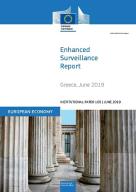
- Report
- Directorate-General for Economic and Financial Affairs
This is the third enhanced surveillance report on Greece monitoring the commitments made by the Greek government at the Eurogroup of 22 June 2018.
Second enhanced surveillance report
On 27 February 2019, the Commission adopted the second enhanced surveillance report for Greece alongside the winter package under the European Semester. The report assesses Greece’s progress with respect to policy commitments made at the Eurogroup in June 2018. The publication of the report follows a mission to Greece which took place from 21 to 25 January 2019, in which staff from the European Central Bank, the European Stability Mechanism and the International Monetary Fund participated.

- Report
- Directorate-General for Economic and Financial Affairs
This is the second enhanced surveillance report on Greece monitoring the commitments made by the Greek government at the Eurogroup of 22 June 2018.
Update of the second enhanced surveillance report
On 3 April 2019, the Commission adopted an update of the second Enhanced Surveillance Report detailing progress in implementing policy commitments. The update concluded that Greece had taken the necessary actions to achieve all specific reform commitments expected for end-2018.
- 3 APRIL 2019
- ελληνικά(340.79 KB - PDF)
First enhanced surveillance report
On 21 November 2018, the Commission adopted the first enhanced surveillance report for Greece alongside the autumn package under the European Semester. The report covers latest economic and financial developments in Greece as well as an assessment of implementation of reform commitments given by Greece to the European partners at the June 2018 Eurogroup. The publication of the report follows the first post-programme mission to Greece which took place from 10 to 14 September 2018, in which staff from the European Central Bank, the European Stability Mechanism and the International Monetary Fund participated.
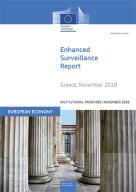
- Report
- Directorate-General for Economic and Financial Affairs
This is the first enhanced surveillance report on Greece following its successful completion of an ESM stability support programme in August 2018.
Activation of enhanced surveillance
On 11 July 2018, the Commission adopted a decision to activate the enhanced surveillance framework for Greece. This decision enters into force after the successful conclusion of the ESM stability support programme on 21 August 2018.
As part of the comprehensive agreement reached in the Eurogroup statement of 22 June 2018, the Greek authorities made commitments, as set out in the annex to the Eurogroup statement to continue the implementation of all key reforms adopted under the ESM programme and sustain their objectives, as well as complete certain key structural reforms initiated under the ESM programme against agreed deadlines.
In parallel, Greece will be fully integrated into the European Semester framework of economic and social policy coordination as from 21 August 2018. Synergies between the enhanced surveillance and European Semester processes will be maximised so as to ensure coherence and avoid undue burdens on the administration. This marks a clear shift towards a new chapter for Greece after years of financial assistance programmes.
Enhanced surveillance is a post-programme framework adapted to Greece in view of the longstanding crisis and challenges faced. It will support the continuation, completion, and delivery of reforms agreed under the programme, in line with the commitments made by the Greek authorities through a close monitoring of the economic, fiscal and financial situation and its evolution. Monitoring will be undertaken by the Commission, in liaison with the ECB, and where appropriate, with the IMF. The ESM will also participate in the context of its Early Warning System as in all other instances of post-programme surveillance.
Enhanced surveillance provides for quarterly reports, which will be the basis for the activation of policy-contingent debt measures agreed in the Eurogroup statement of June 22.
Related documents
- 11 JULY 2018
ESM stability support programme
Fourth and final review
The Eurogroup on 22 June 2018 welcomed the implementation of all the agreed prior actions for the fourth review of the ESM programme, based on the compliance report submitted by the European institutions. This paves the way for the disbursement of the fifth and final tranche under the ESM programme, which will allow Greece to build up a sizeable cash buffer covering financing needs until mid-2020. In addition, the Eurogroup congratulated Greece on the successful completion of the ESM programme and agreed on a substantial package of measures to ensure the sustainability of Greek debt. Completion and continuation of key reforms under the ESM programme will be monitored under enhanced surveillance following the end of the programme.
The European institutions and the Greek authorities reached staff-level agreement on the policy package to be implemented for the completion of the fourth and final review of the ESM programme on 19 May 2018.
The supplemental Memorandum of Understanding (SMoU) lays down the agreement on policy conditionality. It updates the policy conditions set out in the MoU of August 2015 and amended at the end of the first review in June 2016, at the end of the second review in July 2017 and at the end of the third review in March 2018, so as to reflect the progress achieved in programme implementation.
The European institutions submitted a compliance report to the 21-22 June 2018 Eurogroup on the completion of all the agreed prior actions for the fourth review of the ESM programme. This followed the staff level agreement on the policy package for the fourth review that was reached on 19 May 2018.
- 23 JUNE 2018
- 20 JUNE 2018
- 22 JUNE 2018
- 22 JUNE 2018
- 22 JUNE 2018
Third Review
The Eurogroup on 22 January 2018 welcomed the implementation of almost all of the agreed prior actions for the third review, following the staff level agreement on the policy package that was reached on 2 December 2017. Based on the compliance report submitted by the European institutions on 2 March 2018, the EWG verified that the outstanding prior actions have been completed.
The Supplemental Memorandum of Understanding (SMoU) was approved by the ESM Board of Governors and signed by Greece and the European Commission, acting on behalf of the ESM, on 22 March 2018.
The SMoU lays down the agreement on policy conditionality reached between Greece and the European institutions with technical details contained in the supporting draft Technical Memorandum of Understanding (TMU).
The SMoU updates the policy conditions set out in the MoU of August 2015 and amended at the end of the first review in June 2016 as well as at the end of the second review in July 2017 so as to reflect the progress achieved in programme implementation.
The signature of the SMoU led to the authorisation, on 27 March 2018, by the ESM Board of Directors, of the release of the fourth tranche under the ESM programme. The tranche will amount to EUR 6.7 billion, of which EUR 5.7 billion will be disbursed immediately upon implementation of all prior actions and cover debt servicing needs, allow for further clearance of arrears, and support the build-up of cash buffers. The remaining EUR 1 billion will be used for arrears clearance and will be disbursed in spring 2018, subject to positive reporting by the European institutions on the clearance of net arrears using also own resources; and a confirmation from the European institutions that the unimpeded flow of e-auctions has continued.
Related documents
- 27 MARCH 2018
- 27 MARCH 2018
- 2 MARCH 2018
- 22 JANUARY 2018
- 22 JANUARY 2018
Second Review
The second review of the ESM programme was concluded on 7 July 2017.
Upon completion of all prior actions for the second review by Greece, the European Commission, in liaison with the European Central Bank (ECB) and in consultation with the European Stability Mechanism (ESM), prepared a positive assessment of the programme implementation. The Eurogroup on 15 June 2017 welcomed the fulfillment of the agreed prior actions paving the way for the successful completion of the second review. On 30 June 2017, the Council adopted the updated Council Implementing Decision. The supplemental Memorandum of Understanding (SMoU) was approved by the ESM Board of Governors and signed by Greece and the European Commission, acting on behalf of the ESM, on 5 July 2017.
The SMoU lays down the agreement on policy conditionality reached between Greece and the European institutions with technical details contained in the supporting draft Technical Memorandum of Understanding (TMU). The SMoU updates the policy conditions set out in the MoU of August 2015 and amended at the end of the first review in June 2016 to reflect the progress achieved in programme implementation.
The signature of the SMoU led to the authorisation, on 7 July 2017 by the ESM Board of Directors, of the third tranche under the ESM programme. The third tranche amounts to EUR 8.5 billion of which EUR 6.9 billion will cover debt servicing needs; the remaining EUR 1.6 billion will be used for arrears clearance and will be disbursed in two subtranches of EUR 0.8 billion each. The second sub-tranche was disbursed on 30 October 2017, following an assessment of good progress in clearing arrears using the funds already made available as well as own resources.
Related documents

- Report
- Directorate-General for Economic and Financial Affairs
This report contains background analysis related to the design of the August 2015 ESM stability support programme for Greece and the implementation of...
- 23 OCTOBER 2017
- 5 JULY 2017
- 23 JUNE 2017
- 23 JUNE 2017
- 5 JULY 2017
- 23 JUNE 2017
- 30 JUNE 2017
First Review
Following the Eurogroup statement of 25 May 2016, a positive assessment of the programme implementation by the European Commission and European Central Bank (ECB) and the approval of the European Stability Mechanism (ESM), Greece and the European Commission signed a supplemental memorandum of understanding (SMoU) on 16 June 2016. The SMoU updates the policy conditions set out in the MoU of August 2015 to reflect the progress achieved in programme implementation.
The completion of the review led to the disbursement of the second tranche of the ESM programme, amounting to €10.3 billion. The second tranche was disbursed in several steps, starting with a first disbursement of EUR 7.5 billion in June 2016. EUR 5.7 billion of this is to cover debt servicing needs and €1.8 billion is to allow the clearance of an initial part of arrears as a means to support the real economy.
Subsequently, the European institutions submitted a compliance report to the 10 October Eurogroup on the completion of a set of milestones. Furthermore, the European institutions sent a note to the Eurogroup Working Group of 24 October, reporting on good progress with arrears clearance. Based on these assessments, on 25 October 2016, the ESM Board of Directors approved a EUR 2.8 bn disbursement to Greece, which comprised the second disbursement for debt servicing needs (EUR 1.1 bn) as well as the second disbursement for arrears clearance (EUR 1.7 bn), of the second tranche under the ESM Programme.
Related documents
- 16 JUNE 2016
- 27 MARCH 2018
- 27 MARCH 2018
- 27 MARCH 2018
- 1 JUNE 2016
- 8 OCTOBER 2016
- 21 OCTOBER 2016
Launch of the programme
Greece's second programme funded by the European Financial Stability Fund (EFSF) expired on 30 June 2015. The Greek government then made a formal request for stability support from the ESM on 8 July 2015.
The European Commission and the ECB, made a positive assessment of the request because of the risk to the financial stability of the euro area. They provided an assessment of the sustainability of Greece's public debt and financing needs.
This assessment was discussed by the Eurogroup and at the Euro summit on 12 and 13 July 2015. The leaders from the euro area countries agreed in principle that they were ready to start negotiations on an ESM financial assistance programme for Greece, provided a number of strict conditions would be met before negotiations formally began. A short-term bridge loan of €7.16 billion was disbursed under the EFSM on 20 July 2015 to cover financing needs until the ESM programme would be launched.
The Eurogroup reached political agreement on 14 August 2015 based on:
- the adoption of measures by the Greek authorities
- the ESM Board of Governors' approval of further assistance accompanied by a stability support programme under the ESM framework
Greece then signed a memorandum of understanding (MoU) with the European Commission, acting on behalf of the ESM, on 19 August 2015. On this basis, the Greek authorities signed a financial assistance facility agreement (224.69 KB - PDF) with the ESM to specify the financial terms of the loan.
At the same time, the Council of the European Union adopted decisions approving the stability support programme and the updated fiscal path for Greece. This paved the way for mobilising up to €86 billion in financial assistance over three years (2015-18).
Conditions of the programme
The funds provided by the ESM are linked to progress in implementing the policy conditions agreed in the MoU. The policies are built around four pillars:
- restoring fiscal sustainability
- safeguarding financial stability
- growth, competitiveness and investment
- a modern State and public administration
The measures are intended to enable the Greek economy to return to sustainable growth based on:
- sound public finances
- enhanced competitiveness
- high employment
- financial stability
Progress in paying out the funds
Under the ESM programme, a first disbursement of €13 billion was made on 20 August 2015 following signature of the MoU.
An additional €10 billion was earmarked for bank recapitalisation and resolution. These funds were intended to allow the Greek state to:
- repay the short-term bridge loan disbursed under the EFSM
- mitigate hindrances to economic activity by
- covering financing needs
- making overdue payments
- addressing financial sector needs
Additional funds were subject to the verification of the achievement of 2 sets of milestones:
- The first set of milestones as reached in October 2015 which led to a further disbursement of €2 billion.
- The second set of milestones was achieved in December 2015 which led to a disbursement of €1 billion.
The ESM also gave the Hellenic Financial Stability Fund the funds necessary to cover its investment of €5.4 billion in the banking sector recapitalisation.
Related documents
Agreements
- 12 JANUARY 2017
- 27 MARCH 2018
- 27 MARCH 2018
- 19 AUGUST 2015
Report on progress
- 29 MARCH 2018
- 29 MARCH 2018
- 29 MARCH 2018
- 29 MARCH 2018
Press releases
Press release of August 2015
Q&A of August 2015
Supporting documents
- 29 MARCH 2018
- 29 MARCH 2018
Debt sustainability
After having completed the first review of the ESM stability support programme, the Eurogroup on 25 May 2016 committed to ensuring the sustainability of the Greek debt by smoothening payment profiles and designing other debt-management measures. For that occasion, the European institutions presented the Eurogroup with an updated assessment of the sustainability of Greek debt, which is published in the Compliance report
The Eurogroup agreed on a package of debt measures to be phased in progressively, as necessary to meet the agreed benchmark on gross financing needs. The package is subject to the pre-defined conditionality of the ESM programme. This was the first time that the Eurogroup defined a set of criteria for the debt restructuring in line with the commitment made in July 2015 to ensure that gross financing needs remain at a sustainable level.
In the short term, the first set of measures started to be implemented after the closure of the first review up to the end of the programme. These include:
- smoothening the EFSF repayment profile under the current weighted average maturity
- using EFSF/ESM diversified funding strategy to reduce interest rate risk without incurring any additional costs for former programme countries
- waiver of the step-up interest rate margin related to the debt buy-back tranche of the second Greek programme for the year 2017
In the medium term, following the successful implementation of the ESM programme by mid-2018, the Eurogroup is committed to implement further debt-relief measures.
In the long term, the Eurogroup agreed on a contingency mechanism on debt to be activated after the ESM programme to ensure debt sustainability in the long run.
- The current debt sustainability analysis updates the assessment carried out in July 2015.
- The Eurogroup reiterated certain commitments in its statement of 15 June 2017
Social impact
During the negotiations, the Commission promoted the need to improve social cohesion as an outcome of the programme by:
- sharing the burden of the adjustment equitably
- protecting the most vulnerable in society
This is in line with Commission President Junker's political guidelines.
Before committing to the ESM stability support programme, in August 2015, the Commission published its assessment of the programme's social impact.
The assessment concludes that if the programme is implemented in a timely and thorough manner it will:
- help Greece return to stability and growth in a financially and socially sustainable way
- contribute to efforts to meet Greece's most pressing social challenges
Supporting Growth and Investment
The Commission presented a jobs and growth plan for Greece on 15 July 2015. The plan complements the stability support programme and aims to give its reform package the best chance of success.
If Greece makes best use of available EU funds, €35 billion could be available to invest in people and businesses by 2020, providing a powerful additional stimulus.
Press release: Commission mobilises more than €35 billion from the EU budget
Press release: A new start for jobs and growth in Greece (276.11 KB - PDF)
The Commission also strengthened its offer of technical assistance and expertise, through its dedicated Structural Reform Support Service (SRSS) established in July 2015. The SRSS mobilises expertise from the Commission services, national administrations and international organisations to design and monitor reforms, across nearly all reform areas.
- 29 MARCH 2018
Disbursements
An overview of disbursements of European Stability Mechanism (ESM) financial assistance in the context of the ongoing stability support programme for Greece is provided on the ESM website.
First tranche and disbursement to Greece
- 10 JULY 2015
Timeline and background on the stability support programme for Greece
On 8 July 2015, Greece made an official request for stability support, in the form of a loan facility, to the ESM to be used to:
- meet debt obligations
- ensure the stability of its financial system
A separate request for financial assistance was sent to the International Monetary Fund (IMF) on 23 July 2015.
On 12-13 July, a euro area summit examined the situation and issued a detailed statement on the way forward.
On 15 July and 22 July, the Greek authorities passed several sets of legislation, in line with the commitments taken at the summit.
On 17 July, the Council approved a Commission proposal for a Council implementing Decision on granting short term financial assistance to Greece and an amendment to the Council Regulation establishing a European financial stabilisation mechanism.
Also on 17 July, The Eurogroup asked the European institutions to start the negotiations on a memorandum of understanding (MoU) detailing the conditions for a financial assistance facility covering the period 2015-18, in accordance with Article 13 of the ESM Treaty. The work was carried out by the European Commission and the European Central Bank, along with the IMF and the ESM.
On 11 August, the Greek authorities and the European institutions reached a staff level agreement on the MoU. Euro area finance ministers endorsed it politically on 14 August and, on the same day, the Greek authorities passed another package of legislation adopting all the measures required for the disbursement.
The necessary approval was obtained from national parliaments, and then the ESM board of governors approved the MoU on 19 August. It was then signed by the Commission, on behalf of the ESM, as well as by the Greek government and central bank.
On 5 October, the Eurogroup endorsed the first set of milestones, which unlocked EUR 2 billion of the first release under the ESM programme.
On 9 November, the Eurogroup discussed the results of ECB comprehensive assessment of the four major Greek banks (Alpha Bank, Eurobank, National Bank of Greece and Piraeus Bank). The review identified a total capital shortfall in the four banks amounting to EUR14.4 billion.
On 23 November, the Eurogroup welcomed Greece's successful implementation of the first set of milestones which allowed the release of an additional tranche amounting to EUR2 billion, authorised by the ESM board of directors.
On 22 December, the positive assessment of the second set of milestones led the ESM board of directors to authorize the release of EUR 1 billion. The ESM also released EUR 5.4 billion to Greece for bank recapitalisation.
On 14 January 2016, the first review of the programme implementation was launched. The Eurogroup announced that the successful completion of the review would pave the way for decisions on possible debt relief measures and an IMF programme, as agreed by the heads of state or government in July 2015.
On 9 May, the Eurogroup welcomed a package of policy reforms to conclude the first review.
On 24 May, the Eurogroup endorsed a staff-level agreement between Greece and the European institutions, therefore enabling the ESM to unlock the next tranche of financial assistance to Greece worth EUR 10.3 billion. The Eurogroup also agreed on a phased approach to ensure the sustainability of Greece's public debt.
On 16 June, Greek Minister for Finance and the EU institutions signed a supplemental memorandum of understanding (SMoU).
- 16 JUNE 2016
On 17 June the ESM board of directors authorised the release of EUR 7.5 billion to Greece.
Second programme for Greece
On 14 March 2012, euro area finance ministers approved financing of the second economic adjustment programme for Greece. The euro area countries and the IMF committed the unreleased amounts of the first programme (Greek loan facility) plus an additional €130 billion for the years 2012-14.
Unlike the first programme, which was based on bilateral loans, the euro area countries agreed that the second programme would be financed by the European financial stability facility (EFSF), fully operational since August 2010.
The second programme foresaw total financial assistance of €164.5 billion until the end of 2014. The period was later extended to 30 June 2015. Of this amount
- the euro area committed to contribute €144.7 billion to be provided via the EFSF
- the IMF committed to contribute €19.8 billion. This is part of a 4-year €28 billion arrangement under the extended fund facility for Greece that the IMF approved in March 2012.
Additionally, when launching the second programme it was agreed that there should be private sector involvement (PSI) to improve the sustainability of Greece's debt. The high participation to Greece's debt exchange offer in spring 2012 made a significant contribution to this goal. Out of a total of €205.6 billion in bonds eligible for the exchange offer, approximately €197 billion, or 95.7% have been exchanged.
The release of the financial assistance is based on observance of quantitative performance criteria and a positive evaluation of progress made with respect to policy criteria, detailed in Council Decision 2011/734/EU of 12 July 2011 (as amended in November 2011, 13 March and 4 December 2012) and the memorandum of understanding setting the economic policy conditionality.
Implementation of the programme
In spring 2012, uncertainty about the possible outcome Greece's election led to an acceleration of capital outflows and doubts about Greece's capacity to implement the adjustment programme.
The 17 June election led to the formation of a coalition government of three parties with the mandate to secure Greece's future in the euro area, and hence to implement the economic adjustment programme.
The new government began identifying and taking the measures needed to catch up on the implementation of the programme. The difficulty to fulfil conditions in the immediate aftermath of the elections significantly delayed the release of the next tranches of the loans from international lenders which took a heavy toll on the economy.
Against this background, and taking into account the action taken by the authorities, on 26-27 November 2012 the euro area finance ministers and the IMF agreed to extend the fiscal adjustment path by 2 years. This involved a reduction of the primary surplus target for 2014 from 4.5% of GDP to 1.5% of GDP and an even annual adjustment of 1.5% of GDP until a primary surplus of 4.5% of GDP is achieved in 2016.
The finance ministers and the IMF also agreed on a package of measures to reduce Greece's debt to 124% of GDP by 2020.
Euro area countries agreed to:
- lower the interest rate charged to Greece on the loans provided in the context of the Greek loan facility by 100 basis points (bps)
- lower the guarantee fee costs paid by Greece on the EFSF loans by 10 bps
- extend the maturities of the bilateral and EFSF loans by 15 years and defer Greece's interest payments on EFSF loans by 10 years
- a commitment by EU countries to pass on to Greece's segregated account, an amount equivalent to the income on the securities markets programme (SMP) portfolio accruing to their national central bank as from budget year 2013
At the same time Greece announced that it was considering certain debt reduction measures (debt buy-back operation), through public debt tender purchases of the various categories of sovereign obligations.
On 12 December 2012, following the finalisation of the relevant national procedures and after having reviewed the outcome of the debt buy back operation conducted by Greece, the Eurogroup approved the second instalment under the second economic adjustment programme for Greece. On that basis, EU countries authorised the EFSF to release the next instalment for a total amount of €49.1 billion.
The money was released in several phases. €34.3 billion was paid out in December 2012. The remaining amount was released in the first quarter of 2013 as follows:
- first, €7.2 billion was made available to cover bank recapitalisation and resolution costs
- second, funds to cover budgetary financing were released in three sub-phases, linked to the implementation of specific memorandum of understanding milestones agreed by the European Commission, ECB and IMF known collectively as the Troika
The next tranches of €2.0 billion, €2.8 billion and €2.8 billion were paid out on 31 January, 28 February and 3 May 2013 respectively, following the endorsement by euro area countries of the Commission's assessment of achievement of the relevant milestones.
On 15 April 2013, staff teams from the Troika concluded their mission to Greece in the context of the second review of the second adjustment programme. The mission reached staff-level agreement with the authorities on the economic and financial policies needed to ensure the program remains on track to achieve its objectives.
On 13 May 2013, the Eurogroup concluded that all necessary elements were in place for EU countries to finalise the national procedures required to approval the next instalment, to be released in 2 sub-tranches.
Following the completion of national procedures and the full implementation of the relevant prior actions, the first sub-tranche of € 4.2billion was approved by the euro working group (EWG) and EFSF Board of Directors, and was disbursed on 17 May 2013.
The second sub-tranche, of € 3.3billion, was disbursed on 25 June 2013, following the approval by the EWG and Board of Directors on 13 June 2013. The approval was based on the relevant recommendation made by European Commission, ECB and IMF staff, after their assessment of the implementation of the three specific MoU milestones.
The third review of the second adjustment programme was concluded on 8 July 2013, with the staff teams reaching a staff-level agreement, ad referendum, with the Greek authorities. On the same day, the Eurogroup noted that the programme was broadly on track and authorised the EWG and EFSF Board of Directors to approve the next EFSF instalment of €3 billion which would take place in 2 sub-tranches.
At the same time, the Eurogroup mandated the EWG and the EFSF to also approve the release of an amount of €2 billion, equivalent to the income on the securities market programme (SMP) portfolio accruing to euro area central banks, to Greece’s segregated account, to take place in a similar way in 2 sub-tranches.
The first sub-tranche of €2.5 billion was approved on 26 July 2013 by the EWG and the EFSF board following the full implementation of the prior actions. The amount was released on 31 July 2013, after EU countries finalised their relevant national procedures. The sub-tranche of €1.5 billion income on the SMP portfolio was paid at the same time.
The second sub-tranche of €0.5 billion was approved and released on 17 December 2013 by the EWG and the EFSF Board following the full implementation of all related milestones. The sub-tranche of €0.5 billion income on the SMP portfolio was paid at the same time.
In the context of the fourth review under the second adjustment programme, on 19 March 2014 the teams from the European Commission, the ECB and the IMF reached a staff-level agreement with the authorities on the economic and financial policies needed to ensure that the programme remained on track.
Based on the assessment by the Commission in liaison with the ECB, the Eurogroup of 1 April 2014 concluded that the necessary elements were in place to approve an EFSF instalment of €8.3 billion. This would be released in 3 sub-tranches, on the condition that all relevant milestones were fulfilled.
A first tranche of €6.3 billion was released on 28 April 2014, following full implementation of the related prior actions and finalisation of EU countries' relevant national procedures. Following the implementation of the first set of milestones (26.52 KB - PDF), due by the end of May 2014, the EWG and the EFSF Board of Directors approved respectively on 4 and 7 July the release of the second tranche of €1 billion. It then took place on 9 July 2014.
The release of the third and final sub-tranche of €1 billion was approved by the EWG and the EFSF Board of Directors on 13 August 2014 after the implementation of the second set of milestones (45.33 KB - PDF) due by the end of June. The release took place on 14 August.
A full mission of Troika teams arrived in Athens on 29 September 2014, starting policy discussions in the context of the fifth review of the second adjustment programme for Greece.
Discussions were interrupted in early December 2014, when the process to elect a new Greek president was launched. After 3 unsuccessful votes snap parliamentary elections had to be called for 25 January 2015. This significantly raised political uncertainty, particularly in view of the scheduled expiry of the adjustment programme by 28 February. The elections saw the success of Syriza, which had been until then in the opposition.
After intense negotiations between the newly-elected government and euro area EU countries, assisted by the European Commission, the ECB, and the IMF, the Greek government requested an extension of the Master Financial Assistance Facility Agreement for Greece on 18 February. The Eurogroup agreed to extend the programme by 4 months, based on the Greek government's0 commitment to a comprehensive list of reforms and the completion of the national parliamentary procedures. The extension was finalised by a decision of the EFSF Board of Directors on 27 February.
On 27 February 2015, €10.9 billion that was earmarked but not needed for bank recapitalisation was returned by the Hellenic financial stability fund (HFSF) to the EFSF. The current outstanding loan amount of the EFSF programme is €130.9 billion.
Following this repayment intensive negotiations took place between the European institutions and the Greek authorities to seek conclusion of the fifth review but agreement could not be found. Therefore the review could not be concluded and the second programme expired on 30 June 2015.
Related documents
- 29 MARCH 2018
- 29 MARCH 2018
The second economic adjustment programme for Greece – 4th review
- 29 MARCH 2018
- 29 MARCH 2018
The second economic adjustment programme for Greece – 3rd review July 2013
- 29 MARCH 2018
- 29 MARCH 2018
The Second Economic Adjustment Programme for Greece - Second Review May 2013
- 29 MARCH 2018
- 29 MARCH 2018
- 29 MARCH 2018
- 29 MARCH 2018
The Second Economic Adjustment Programme for Greece - First Review December 2012
The Second Economic Adjustment Programme for Greece - March 2012
Overview of release of funds under the second programme
In total, €141.8 billion have been released by the EFSF under the second economic adjustment programme for Greece. On 27 February 2015, €10.9 billion that was earmarked but not needed for bank recapitalisation was returned by the Hellenic Financial Stability Fund (HFSF) to the EFSF. Accordingly, the outstanding loan amount of the EFSF programme stands at €130.9 billion.
Disbursements under the second programme have taken place as follows:
| Disbursement | Date | EFSF | IMF | Total |
|---|---|---|---|---|
| 1 | March – June 2012 / 1 | 74 | 1.6 | 75.6 |
| 2.1 | December 2012 / 2 | 34.3 | - | 34.3 |
| 2.2 | January 2013 / 3 | 7.2 | - | 7.2 |
| 2.3 | January 2013 | 2.0 | 3.24 | 5.24 |
| 2.4 | February 2013 | 2.8 | - | 2.8 |
| 2.5 | May 2013 | 2.8 | - | 2.8 |
| 3.1 | May 2013 / 4 | 4.2 | 1.74 | 5.94 |
| 3.2 | June 2013 | 3.3 | - | 3.3 |
| 4.1 | July 2013 / 5 | 2.5 | 1.8 | 4.3 |
| 4.2 | December 2013 | 0.5 | - | 0.5 |
| 5.1 | April 2014 / 6 | 6.3 | 3.6 | 9.9 |
| 5.2 | July 2014 | 1.0 | - | 1.0 |
| 5.3 | August 2014 | 1.0 | - | 1.0 |
1/ The first instalment under the Second Programme took place in 7 tranches from March to June 2012.
2/ The second instalment amounted to €52.34 billion in total (EFSF and IMF) and was made in several tranches between December 2012 and May 2013.
3/ Amount made available since 28 January 2013 to cover bank recapitalisation and resolution costs, disbursed on 31 May 2013 as requested by the Greek authorities.
4/ The third instalment amounted to €9.24 billion in total (EFSF and IMF) and was made in two tranches in May and June 2013.
5/ The fourth instalment amounted to €4.8 billion in total (EFSF and IMF). The disbursement by the EFSF would be made in two tranches. The first tranche of €2.5 billion was disbursed on 31 July 2013. At the same time, €1.5 billion of income on the SMP portfolio accruing to euro area national central banks – not counted in the financial envelope – was also transferred to Greece. The second tranche of €0.5 billion was disbursed on 20 December 2013. Similarly to the previous sub-tranche, €0.5 billion of income on the SMP portfolio accruing to euro area national central banks – not counted in the financial envelope – was also transferred.
6/ The fifth instalment amounted to €9.9 billion in total (EFSF and IMF) and was made in two tranches in July and August 2014.
First programme for Greece
On 2 May 2010, the Eurogroup agreed to provide bilateral loans pooled by the European Commission (Greek Loan Facility – GLF) for a total amount of €80 billion to be released over the period May 2010 to June 2013. This amount was subsequently reduced by €2.7 billion, because Slovakia decided not to participate in the Greek loan facility agreement while Ireland and Portugal stepped down from the facility as they requested financial assistance themselves.
The financial assistance agreed by euro-area EU countries was part of a joint package, with the IMF committing additional €30 billion under a stand-by arrangement (SBA).
Related documents
The Economic Adjustment Programme for Greece. Fifth review - autumn 2011 (45.33 KB - PDF)
The Economic Adjustment Programme for Greece. Fourth review - spring 2011
The Economic Adjustment Programme for Greece. Third review - February 2011
The Economic Adjustment Programme for Greece. Second review - autumn 2010
The Economic Adjustment Programme for Greece. First review - summer 2010
The Economic Adjustment Programme for Greece
See also: Economies of the EU countries - Greece
Task Force for Greece
In July 2011, the Commission set up the Task Force for Greece on the request of the Greek government, and appointed Horst Reichenbach as its head. The main objectives of the task force were to:
- identify and coordinate the technical assistance that Greece needed in order to meet the terms of the EU/IMF adjustment programme. This was (to be?) done in close cooperation with Greece and benefitting from input from other EU countries
- help the Greek authorities define the details of the technical assistance to be provided
- recommend legislative, regulatory, administrative and if necessary (re)programming measures for an accelerated take-up of EU funds, focussing on competitiveness, growth and employment
The Task Force for Greece has been replaced by the Structural Reform Support Service
More information on the Structural Reform Support Service
